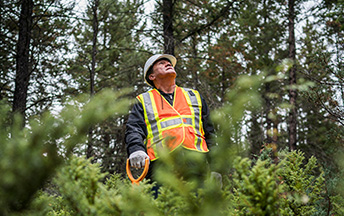Definitions
a
-
acre
approximately 0.004 square kilometres
-
AGM
Annual General Meeting
-
AOSP
Athabasca Oil Sands Project
-
API
American Petroleum Institute
b
-
b(/d)
barrels (per day)
-
boe(/d)
barrels of oil equivalent (per day); natural gas volumes are converted into oil equivalent using a factor of 5,800 scf per barrel
-
Bonuses
Payments for bonuses usually paid upon signing an agreement or a contract, or when a commercial discovery is declared, or production has commenced or production has reached a milestone.
c
-
Carbon-neutral
The carbon dioxide equivalent life-cycle emissions of the product have been offset with verified nature-based carbon credits.
-
CCS
carbon capture and storage
-
CEO
Chief Executive Officer
-
CFO
Chief Financial Officer
-
CO2
carbon dioxide
-
Consumption taxes
A tax due on the purchase of goods and services. Typically, this is a percentage of the sales price of the item or service. It is an indirect tax as it is levied and administered by the retailers or service providers but it is borne or paid by the individual purchasing the item. The companies that charge the tax have to administer the collection and payment on behalf of the government.
-
Corporate income tax
This is a direct tax imposed on companies’ profits. It is sometimes levied at a national level but can also be levied on a state or local basis.
-
CPEA
Certified Professional Environmental Auditor
-
Critical habitat
Represents areas of high biodiversity value, it takes into account both global and national priorities and builds on the conservation principles of ‘vulnerability’ (threat) and ‘irreplaceability’ (rarity/restricted distribution). It is identified based on five criteria that address habitat of significant importance to threatened, endemic, congregatory and migratory species, threatened or unique ecosystems, and key evolutionary processes (IFC, 2019).
-
CSSD
Center for Sustainable Shale Development
e
-
EOR
enhanced oil recovery
-
EPA
US Environmental Protection Agency
-
Ethnic minority
In the UK, this group includes all ethnic groups other than the ‘white British’ group
-
Excise duties
This is a tax on manufacturers and is due at the point of production rather than sale. Companies which manufacture products that are subject to excise duties are responsible for reporting and paying these taxes. Excise taxes are in addition to other forms of indirect tax, such as customs duties, VAT or GST, and typically form part of the cost of the product.
f
-
Fees
Fees and other sums paid as consideration for acquiring a licence for gaining access to an area where extractive activities are performed. Administrative government fees that are not specifically related to the extractive sector, or to access to extractive resources, are excluded. Also excluded are payments made in return for services provided by a government.
-
FID
final investment decision
-
FLNG
floating liquefied natural gas
g
-
GAAP
generally accepted accounting principles
-
GHG
greenhouse gas
-
GRI
Global Reporting Initiative
-
GTL
gas to liquids
h
-
HSE
health, safety and environment
-
HSSE
health, safety, security and environment
-
HSSE&SP
health, safety, security, environment and social performance
i
-
IEA
International Energy Agency
-
IFRS
International Financial Reporting Standard(s)
-
IOGP
International Association of Oil & Gas Producers
-
IPCC
Intergovernmental Panel on Climate Change
-
IPIECA
The global oil and gas industry association for advancing environmental and social performance
-
ISO
International Organization for Standardization
-
IUCN
International Union for Conservation of Nature
j
-
JV
joint venture
k
-
kboe(/d)
thousand barrels of oil equivalent (per day); natural gas volumes are converted into oil equivalent using a factor of 5,800 scf per barrel
l
-
LNG
liquefied natural gas
-
LPG
liquefied petroleum gas
-
LTIP
Long-term incentive plan
m
-
megajoule
a unit of energy equal to one million joules
-
MMBtu
million British thermal units
-
MOU
memorandum of understanding
-
mtpa
million tonnes per annum
-
MWCC
Marine Well Containment Company
n
-
NCF
Net Carbon Footprint
-
NCI
net carbon intensity
-
Net positive impact
Net Positive Impact (NPI) on biodiversity is a target for project outcomes in which the impacts on biodiversity (i.e. the variety of ecosystems and living things) caused by the project are outweighed by the actions taken to avoid and reduce such impacts, rehabilitate affected species/landscapes and offset any residual impacts. (IFC, 2019)
-
NETS
Network of Employers for Traffic Safety
-
Net-zero deforestation
Deforestation occurs when forests are converted to non-forest uses. In line with the definition of forest used by the Food and Agriculture Organization of the United Nations (2020), this commitment applies to land spanning more than 0.5 hectares with trees higher than five metres and a canopy cover of more than 10%, or trees able to reach these thresholds in situ. It does not include land that is predominantly under agricultural or urban land use. Biological status of forested areas after reafforestation to be equal or higher from original status.
-
NGL
natural gas liquids
-
NGO
non-governmental organisation
o
-
OECD
Organisation for Economic Co-operation and Development
-
OPEC
Organization of the Petroleum Exporting Countries
p
-
People of colour
In the USA, this group includes American Indian or Alaskan Native; Asian, Black or African American; Hispanic/Latino; Native Hawaiian or Other Pacific Islander; or two or more races.
-
per day
volumes are converted into a daily basis using a calendar year
-
Production entitlement
This is the host government’s share of production. It includes the government’s share as a sovereign entity or through its participation as an equity or interest holder in projects within its home country.
-
PSC
production-sharing contract
-
PSP
Performance Share Plan
r
-
R&D
research and development
-
REMCO
Remuneration Committee
-
ROACE
return on average capital employed
-
Royalties
Royalties are generally payment due for the use of an asset. Mineral royalties are payments to governments or other owners for the rights to extract oil and gas resources, typically at a set percentage of revenue less any deductions that may be taken. See also Trademark royalties.
s
-
SAF
Sustainable aviation fuel
-
scf(/d)
standard cubic feet (per day)
-
SCiN
Shell Companies in Nigeria
-
SEC
US Securities and Exchange Commission
-
SESCo
Safety, Environment and Sustainability Committee
-
SNEPCo
Shell Nigeria Exploration and Production Company
-
Solar power capacity
Solar power installed capacity is measured in megawatts direct current (MWdc) as per industry standard. Solar power capacity for generation is shown in megawatts alternating current (MWac).
-
SP
Social Performance
-
SPDC
Shell Petroleum Development Company of Nigeria Limited
-
STV
Shell Technology Ventures
t
-
TRCF
total recordable case frequency
-
TSR
total shareholder return
u
-
UN
United Nations
-
UNDP
United Nations Development Programme
-
UNEP
United Nations Environment Programme
v
-
VOC
volatile organic compounds
-
VPSHR
Voluntary Principles on Security and Human Rights, which guide companies in assessing human rights risks when working with public and private security
w
-
WBCSD
World Business Council for Sustainable Development
z
-
Zero waste
The conservation of all resources by means of responsible production, consumption, reuse and recovery of products, packaging and materials without burning, and with no discharges to land, water, or air that threaten the environment or human health (Zero Waste International Alliance, 2018).









